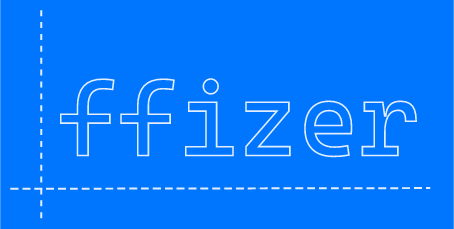66 releases (stable)
Uses new Rust 2024
| 2.13.2 | Apr 8, 2025 |
|---|---|
| 2.13.1 | Jan 13, 2025 |
| 2.13.0 | Nov 5, 2024 |
| 2.12.0 | Dec 10, 2023 |
| 0.6.0 | Nov 25, 2018 |
#15 in Template engine
125 downloads per month
185KB
4.5K
SLoC
ffizer is a files and folders initializer / generator. It creates or updates any kind (or part) of project from template(s).
keywords: file generator, project template, project scaffolding, quick start, project bootstrap, project skeleton
Features
- Create or update files and folder from one (or several) template(s).
- A native executable (cli)
- Install via download a standalone single file on system (no requirements like
python,ruby,nodejs,java, ...). - Run as fast enough project generator.
- Run with dry mode (useful to test).
- Install via download a standalone single file on system (no requirements like
- A rust library
- Can be included into other tool
- Templates Authoring
- Can be used for any file & folder generation (no specialization to one ecosystem).
- Can start as simple as a folder to copy "as is".
- Can use the Handlebars template syntax for file content, extended with functions:
- To transform strings (toUpperCase, toLowerCase, Capitalize,...)
- To retrieve content via http get (like
.gitignorefromgitignore.io, license from spdx) - ...
- Can replace variables part in file and folder's name
- Can be composed of other templates (applied as layer)
- Can ignore file / folder under conditions
- Can store the content at the root of the folder or under the sub-folder
template
- Templates Hosting
- On a local folder
- On a hosted git repository (public / private,
github/bitbucket/gitlab/ ...)- At the root of the repository
- In a sub-folder of the repository
- In any revision (branch, tag, commit)
A list of alternatives is available on the wiki, feel free to complete / correct.
Usages
Install
curl https://raw.githubusercontent.com/ffizer/ffizer/master/scripts/getLatest.sh | bash
Or download the binary for your platform from github releases, then un-archive it and place it your PATH.
via homebrew (MacOs & Linux)
brew install ffizer/ffizer/ffizer-bin
ffizer upgrade
via cargo
# install pre-build binary via cargo-binstall
cargo binstall ffizer
# install from source
cargo install ffizer --force --features cli
Run
❯ ffizer --help
ffizer is a files and folders initializer / generator.
It creates or updates any kind (or part) of project from template(s)
Usage: ffizer [OPTIONS] <COMMAND>
Commands:
apply Apply a template into a target directory
inspect Inspect configuration, caches,... (wip)
show-json-schema Show the json schema of the .ffizer.yaml files
test-samples test a template against its samples
help Print this message or the help of the given subcommand(s)
Options:
-v, --verbose... Verbose mode (-v, -vv (very verbose / level debug), -vvv) print on stderr
-h, --help Print help information
-V, --version Print version information
https://ffizer.github.io/ffizer/book/
Apply a template (to create or update)
❯ ffizer apply --help
Apply a template into a target directory
Usage: ffizer apply [OPTIONS] --source <URI> --destination <FOLDER>
Options:
--confirm <CONFIRM> ask for plan confirmation [default: Never] [possible values: auto, always, never]
--update-mode <UPDATE_MODE> mode to update existing file [default: Ask] [possible values: ask, keep, override, update-as-remote, current-as-local, show-diff, merge]
-y, --no-interaction should not ask for confirmation (to use default value, to apply plan, to override, to run script,...)
--offline in offline, only local templates or cached templates are used
-s, --source <URI> uri / path of the template
--rev <REV> git revision of the template [default: master]
--source-subfolder <FOLDER> path of the folder under the source uri to use for template
-d, --destination <FOLDER> destination folder (created if doesn't exist)
-v, --variables <KEY_VALUE> set variable's value from cli ("key=value")
-h, --help Print help information
-V, --version Print version information
-
use a local folder as template
ffizer apply --source $HOME/my_templates/tmpl0 --destination my_project -
use a remote git repository as template
ffizer apply --source https://github.com/ffizer/template_sample.git --destination my_projectoutput
Configure variables ✔ project_name · my-project ✔ package_name · my_project Plan to execute - make dir my_project - make dir ├─dir_1 - add file │ └─file_1_1.txt - make dir ├─dir_2_my-project - add file │ └─file_1_2.txt - add file ├─file_1.txt - add file ├─file_2.txt - add file ├─file_3.txt - add file ├─file_4_my_project.txt - add file ├─file_5_my-project.txt - add file └─file_6.hbs
Authoring a template
Start with Template Authoring Tutorial
Few templates
- Any git repositories (in this case ffizer is like
git clone ... && cd ... && rm -Rf .git) - Any local folder (in this case ffizer is like
cp -R ... ...) - Parametrized (with variables) templates:
ffizer/templates_default: the default collections of templates for ffizer (WIP)davidB31 / cg-starter-multi-rust· GitLab Project template for Multi-Bot in Rust on CodinGame.davidB/templates: repository to host the my collections of templates to used with ffizer.- github repo tagged
ffizer-template - samples (used for test, demo) templates_default)
Build
cargo install cargo-make --force
cargo make ci-flow
Update CHANGELOG.md
cargo make update-changelog
git add CHANGELOG.md
git commit -m ':memo: (CHANGELOG) update'
Release a new version by bump patch (or minoror major)
cargo make publish patch # dry-run
cargo make publish --execute patch
Dependencies
~23–45MB
~692K SLoC

